Is AP Computer Science Principles easy or hard? We reveal the AP Comp Sci Principles difficulty rating, based on a unique combination of 2023 pass rate data, and 3,160 class reviews from real AP alumnae collected by r/APStudents.
- Is AP Computer Science Principles Easy Or Hard?
- How Hard Is AP Computer Science Principles: 68 Real Alumnae Share Their Experiences
- What Does It Take To Succeed: How To Study For The AP Comp Sci Principles Exam
- Best books and test prep resources for AP Computer Science Principles
- Where next?
- The Science Of Studying Smart
Is AP Computer Science Principles Easy Or Hard?
AP Computer Science Principles is considered very easy, with class alumnae rating it 2.8/10 for overall difficulty (the easiest class out of the 28 large AP classes surveyed).
The pass rate is about average vs other AP classes, with 68% graduating with a 3 or higher.
AP Comp Sci Principles is quite widely-taken (169,000 entries last year), and 87% would recommend the class, which is very slightly lower than other AP classes.
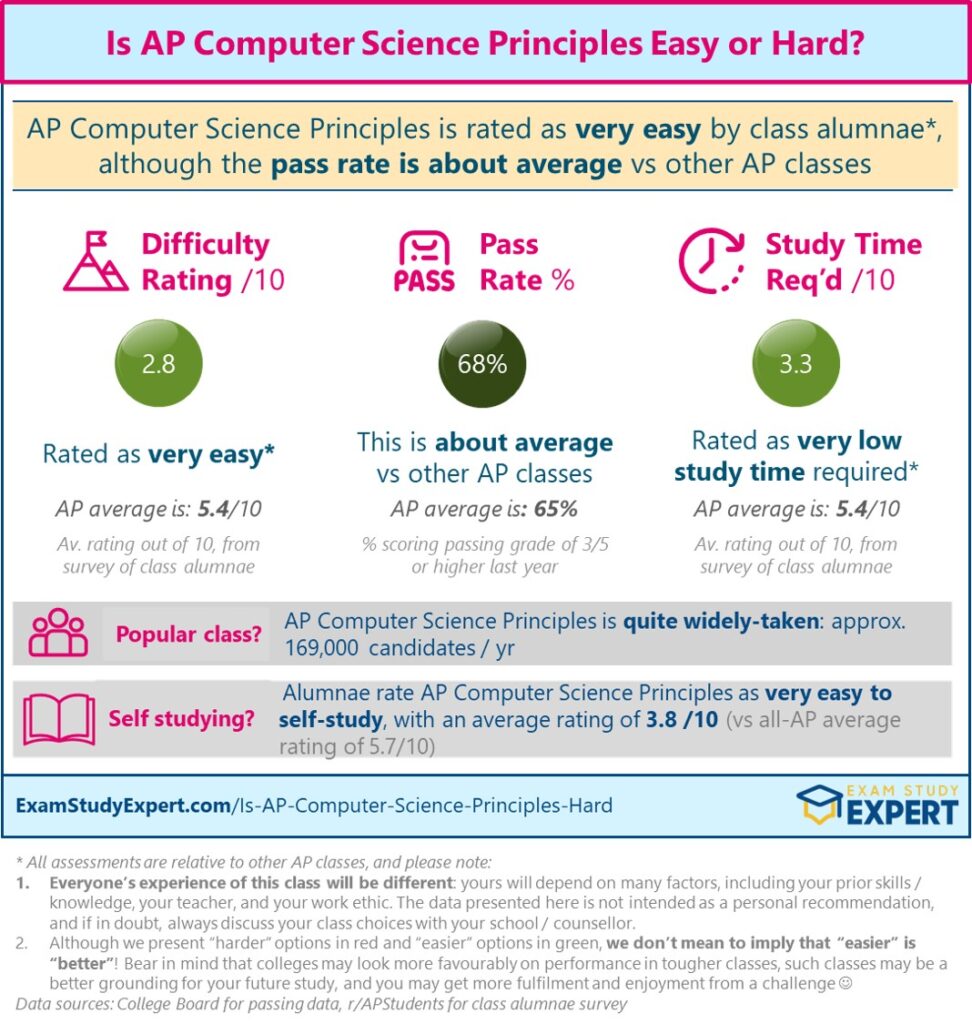
AP Comp Sci Principles alumnae reviewers rated the class as enjoyable, even without prior programming knowledge. The course is recommended as a first AP class.
You can see how AP Comp Sci Principles compares to other classes for difficulty in the below chart:
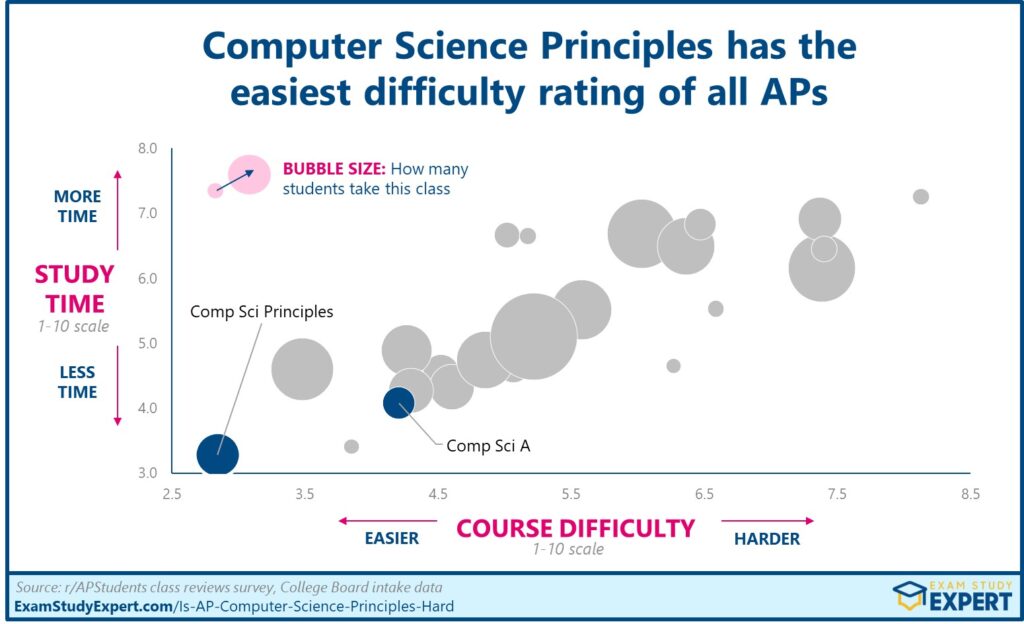
We’ve highlighted AP Computer Science Principles and related computer science classes (Computer Science A) only – to see the full version of this chart, check out our article ranking ALL the AP classes from easy to hard.
You can read more about AP Computer Science A here.
How Difficult Is AP Computer Science Principles – As Rated By Class Alumnae
AP Comp Sci Principles is considered very easy, with class alumnae rating it 2.8/10 for overall difficulty, making it the easiest class out of the 28 large AP classes surveyed.
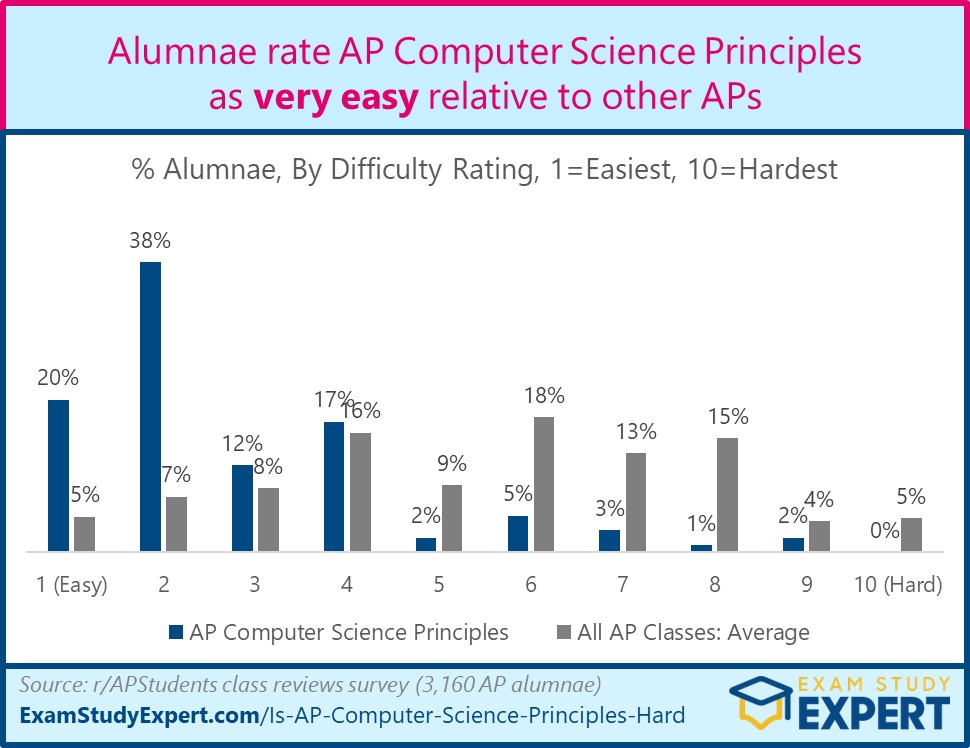
What Is the AP Comp Sci Principles Pass Rate 2023?
The AP Comp Sci Principles 2023 pass rate was 68%, about average compared with other AP classes. The highest percentage of candidates passed with a 3 (33%). A smaller percentage than average attained a 5 (12%) or a 1 (12%), with the remaining grades falling in line with the all-AP average.
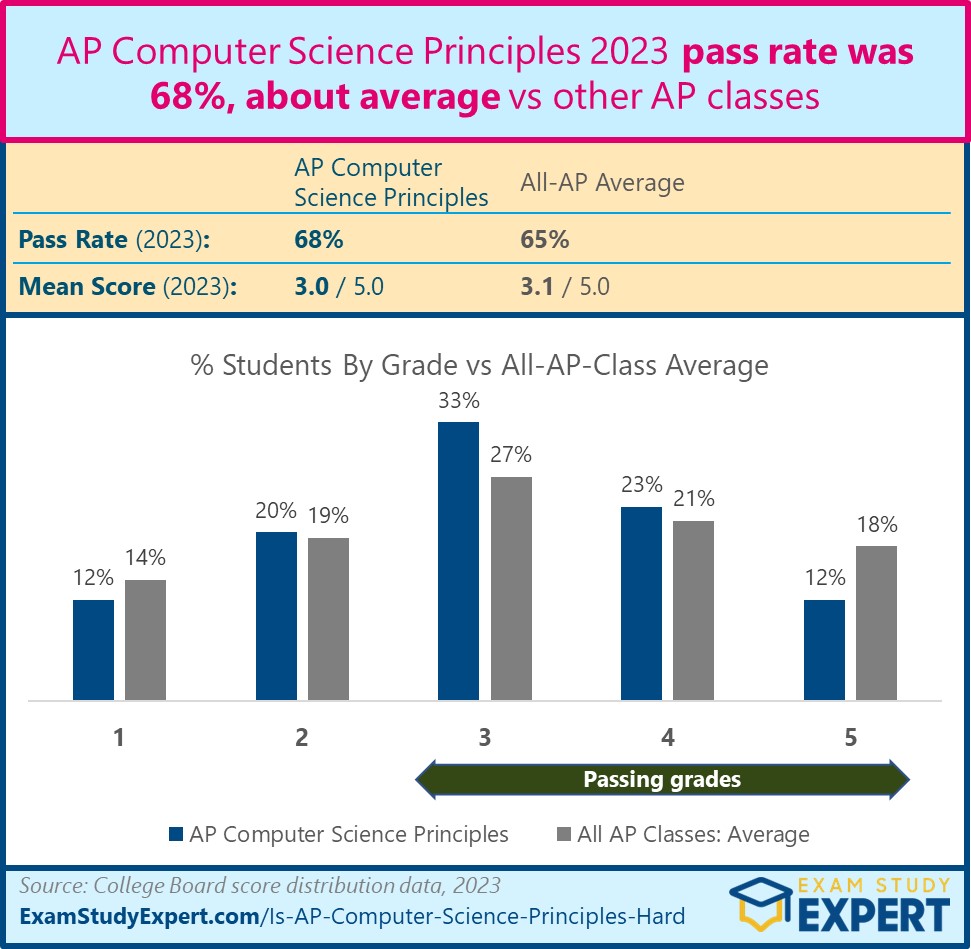
AP Comp Sci Principles Pass Rate / Score Distribution Over Time: 2023, 2022, 2021 …
The AP Computer Science Principles score distribution dropped steadily between 2019 and 2021. However, the pass rate rose in 2022 to 69% and settled at 68% in 2023.
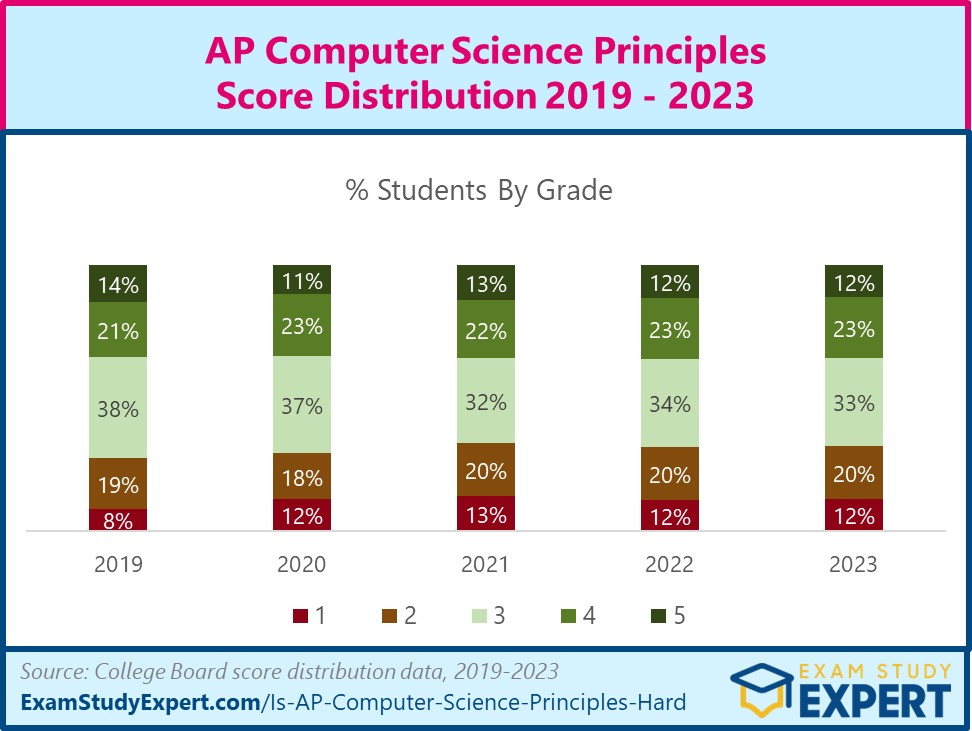
Is AP Computer Science Principles Time Consuming To Study: As Rated By AP Comp Sci Principles Alumnae
AP Comp Sci Principles is rated as very low study time required relative to other AP classes.
A survey of AP alumnae asked for a rating out of 10 for time needed to study each class, with 1 = least time needed, 10 = most time. The average rating for AP Computer Science Principles was 3.3/10 (vs the average across all AP classes of 5.4/10).
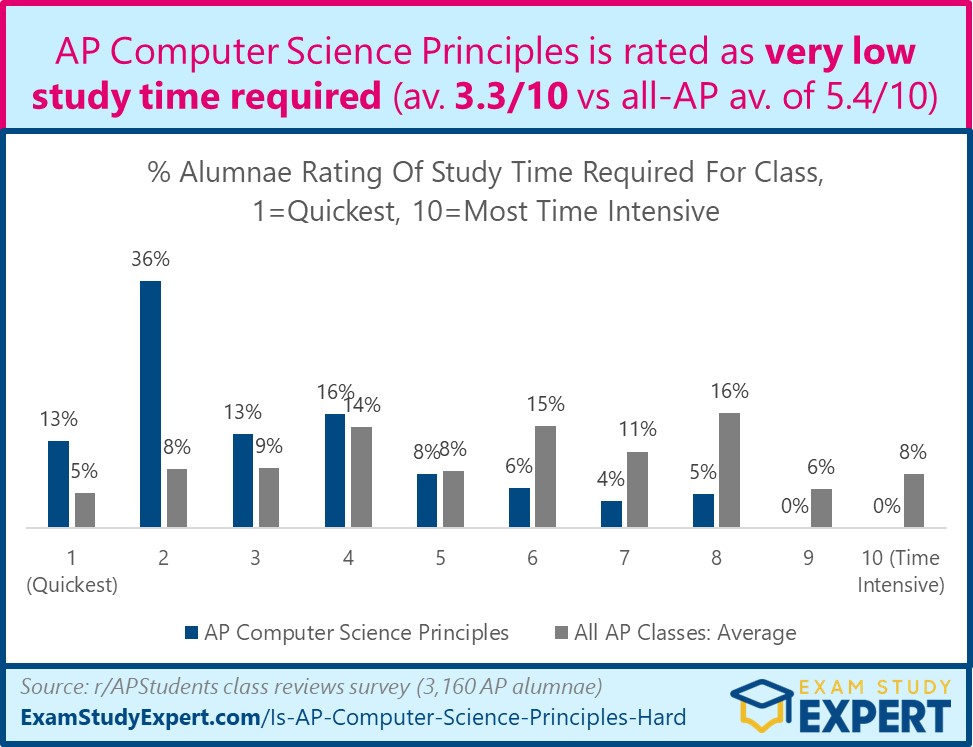
Is AP Comp Sci Principles Easy or Hard To Self-Study
AP Computer Science Principles is rated as very easy to self-study relative to other AP classes.
A survey of AP alumnae asked for a rating out of 10 for how easy each class is to self study, with 1 = easiest to self study, 10 = hardest to self study. The average rating for AP Computer Science Principles was 3.8/10 (vs the average across all AP classes of 5.7/10).
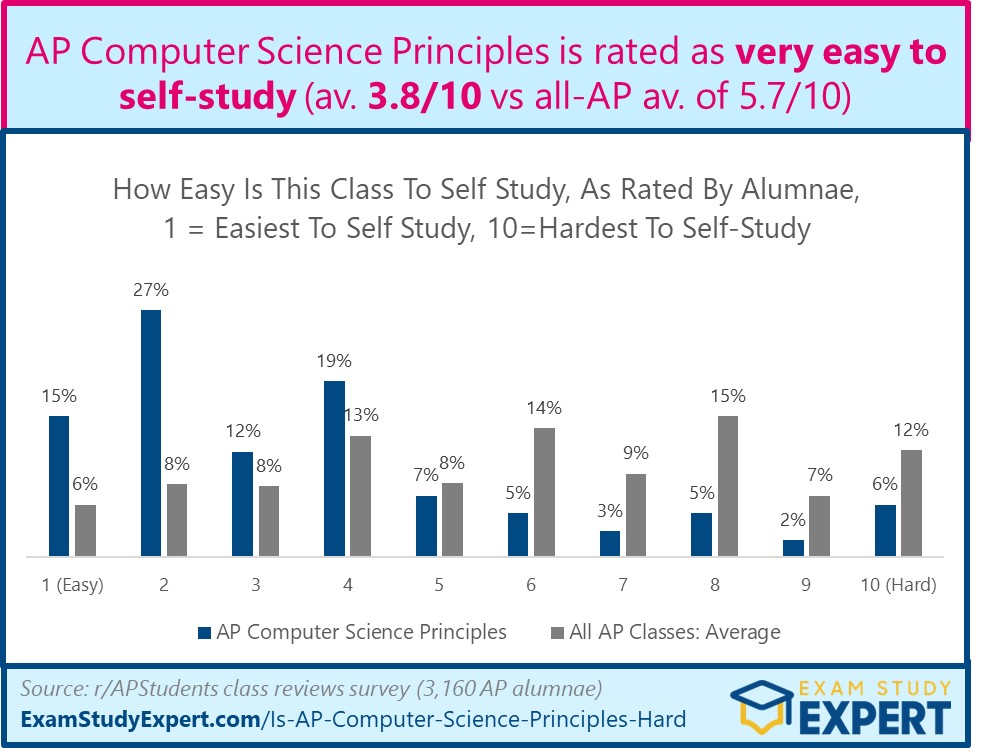
How Hard Is AP Computer Science Principles: 68 Real Alumnae Share Their Experiences
If you’re looking forward to taking AP Comp Sci Principles, it’s important to take both the positive and negative feedback in context. There are multiple factors that could contribute to a great or poor experience of the class, such as a particularly weak teacher and your personal preferences as a learner.
87% of AP Computer Science Principles alumnae would recommend the class,which is very slightly lower than other AP classes.
The majority of the reviews focus on the ease and enjoyment of the course, knowing the exam rubric well, and the importance of the performance tasks.
1. Many students find AP Comp Sci Principles easy and enjoyable …
“If you’ve ever thought about coding and wanted to start at a Middle school level, this is a good place. Also, if you’re already versed in comp sci and want a free 5, this is your AP to self study.” – Score: 5
“This course is easy, even if you know nothing of computers. You can learn all the content of this course over a month rather than a year if you wanted to.” – Score: 5
“I took it for myself and not so much for college, … really enjoyed it and did rather well (98 unweighted classes and 5 and hopefully perfect exam) … I love computer science and this class not only made my junior year very interesting but helped to lighten my load because I enjoyed the work for this class” – Score: 5
“The course is extremely easy, and so my class basically goofed off the entire year. We only got through half of the curriculum by the exam, and I feel that I learned the most from the practice exam (distributed by the College Board, but only through teachers).” – Score: 4
“Cake. The only part that requires any effort is the explore/create task.” – Score: 5
“This class is so easy and you do not need any knowledge of code. It is really hard to get below an A in this class. You use code.org or codehs everyday.”- Score: 3
“If you know how to code or basic CS stuffs then it’s gonna be an easy 5, just remember to follow the rubrics for your personal responses.” – Score: 5
2. … although a few students found the exam hard
“The class is not hard until you get to the AP exam. Buy the Barron’s prep book, it’ll have everything you need for it.” – Score: 5
“If your teacher sucks and you have no prior knowledge in comp sci, get ready to buckle up for a rough ride” – Score: 4
3. AP Comp Sci Principles is considered a great first AP class
“Take AP Computer Science Principles as your first AP class freshman year.’ – Score: 5
“The class itself is basically an intro to AP. It’s the free AP credit they give to freshmen … Anyway, the class is an easy A and the test is an easy 4 or 5. Focus on the performance tasks more than studying for the multiple choice, because I promise you you’ll do fine on the multiple choice if you pay the least bit of attention to the class.” – Score: 5
4. Self-studying isn’t recommended due to the course requirements
“You can’t self study for this exam since you have to submit a portfolio to College Board, which counts towards your exam score. Other than that, easiest AP class I’ve taken. The exam is multiple choice and its nothing really programming based— all you do is go through logic gates, problem solving, and other obstacles programmers face that they would fix with code, but you don’t use do code part yet, you just figure out what you’d need the code to do before you write it. Its like an IQ test almost. Also the explore and create tasks (the portfolio) is simple and easy.” – Score: 4
5. On the downside, a minority of students disliked the course and found it wasn’t worthwhile
“This AP serves no purpose at all, pls don’t waste your money on this.” – Score: 5
“Too easy. Spend time on something else. If you want to learn to code, try code.org, code academy, or team tree house. Don’t spend class time. Take only if you want to raise your GPA i guess.” – Score: 4
What Does It Take To Succeed: How To Study For The AP Comp Sci Principles Exam
What is AP Computer Science Principles? Course Outline & Requirements
According to College Board:
“AP Computer Science Principles introduces students to the breadth of the field of computer science. In this course, students will learn to design and evaluate solutions and to apply computer science to solve problems through the development of algorithms and programs.”
Prerequisites for AP Comp Sci Principles are: successful completion of a first-year high school algebra course (recommended). Students should be able to “use a Cartesian (x, y) coordinate system to represent points on a plane”. Prior computer science experience is not required.
You will develop skills in:
- Designing and evaluating computational solutions
- Developing and implementing algorithms and programs
- Evaluating and testing algorithms and programs
- Investigating computing innovations
- Contributing to an ethical, responsible computing community
The exam consists of one 2-hour exam, with 70% (120 minutes) of multiple-choice questions (MCQs). There is also a “Create performance task” (30%) which requires “requires at least 12 hours of dedicated class time for students to complete”.
For more details, see: College Board’s AP Computer Science Principles course page.
Examiners’ Reviews: Takeaways From AP Computer Science Principles Test Assessors
College Board released the following official comments about the 2021 exam results:
- “AP Computer Science Principles students earned especially high scores on questions about Big Idea 4 (Computer Systems and Networks) and Big Idea 5 (Impact of Computing). A whopping 47% of students earned virtually every point possible in these areas.”
- “Student performance across Big Ideas 1–3 was also solid.”
- “The most challenging items were algorithm questions with no code. 17% of students earned 0–1 point(s) on these questions, and 8% of students answered all of them correctly.”
- “Students scored highest on questions related to Practice 5, investigating computing innovations. 30% of students answered virtually all these questions correctly.”
- “The most challenging practice for students was Practice 2, developing and implementing algorithms”
For best results, you may therefore want to consider investing a little extra study time in algorithm questions, and Practice 2 “Algorithms and Program Development”.
For more details, see: College Board’s AP Computer Science Principles 2021 exam results page.
How To (Self) Study AP Comp Sci Principles: Advice From Class Alumnae
Focus on the rubrics and concepts for the AP exam
“Focus on understanding the concepts and applying them to problems you’ll encounter. This helped me so much when we had to create programs for different units.” – Score: 5
“Make sure to try for the performance tasks, and follow guidelines as much as possible. this is the most subjective AP exam, so make everything clear and align yourself to the rubrics provided. if you have a basic CS knowledge, this should be a breeze.” – Score: 5
“Be thorough on your performance tasks. Check with the rubrics and make sure there is no ambiguity on whether you are earning each point. People who don’t get a 5 usually don’t get it due to performance tasks. The multiple choice is very easy. Also don’t make a difficult app you aren’t graded on the complexity. I completed my app in about an hour. As long as it meets the requirements and you follow the rubric you’re fine.” – Score: 5
You have to put some effort in if you want to succeed
“You will be fine as long as you put some effort into the create and explore tasks. Do some practice questions/tests and skim the vocab in the crash course book.” – Score: 5
“Make sure your performance tasks are good and just go over content within a week of the exam” – Score: 5
“Build with the code you are using in class at home, even if you create just stupid crap, familiarity with your language is key to explaining how your code works the way it does on the ap exam.” – Score: 5
Best books and test prep resources for AP Computer Science Principles
Alumnae reviews reveal that only a small minority of students (32%) use a test prep and review textbook to study for AP Comp Sci Principles.
Within that 32%, the most popular textbook for test prep and review for AP Comp Sci Principles is Crash Course, used by 27% of students who used a book. It has an average rating of 4.2/5.0 from reviewers on Amazon.com.
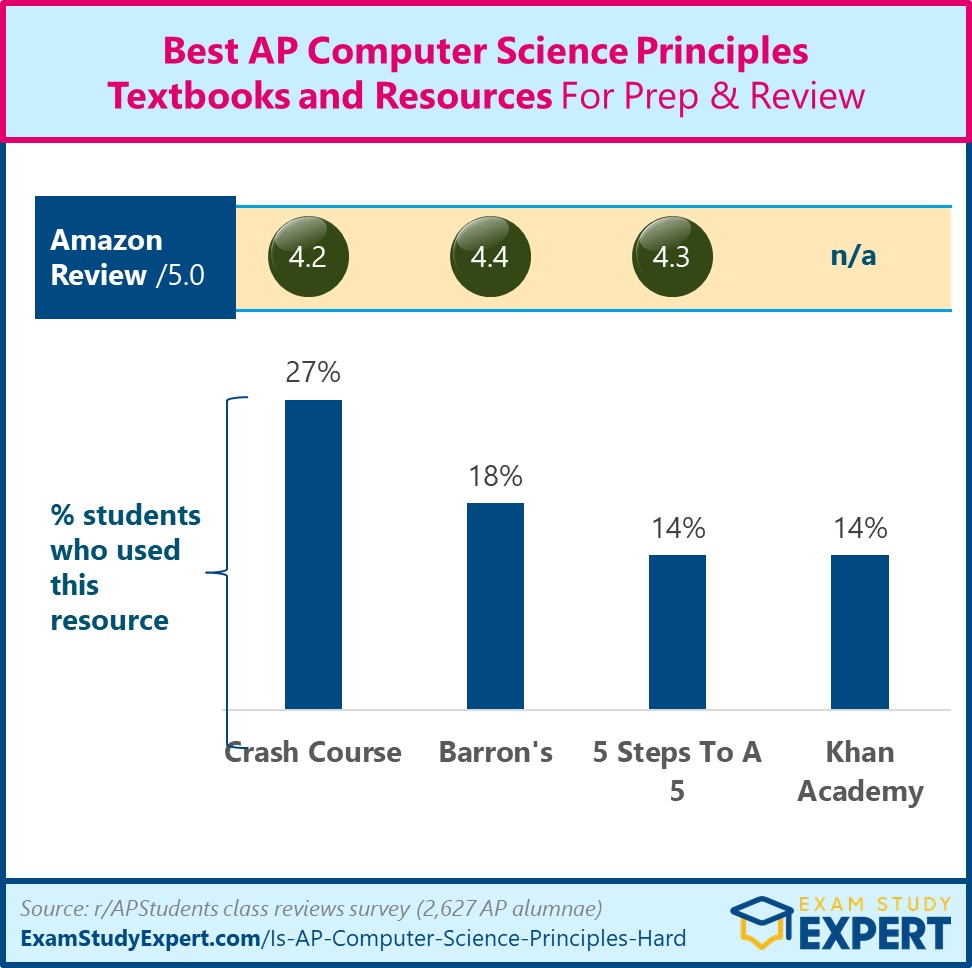
Other popular AP Comp Sci Principles test prep / review books and resources for include:
Where next?
Find out how AP Computer Science Principles compares to other classes: click here for an overview of all AP Classes ranked by difficulty, from easiest to hardest.
Or check out how other computer science courses are rated with our analysis of Is AP Computer Science A Hard?
Wishing you every success in the class!
- [2024] Are AP US Government & Politics and AP Comparative Government and Politics Hard or Easy? Difficulty Rated ‘Quite Easy’ (Real Student Reviews + Pass Data) - 5 Jan 2024
- [2024] Is AP Human Geography Hard or Easy? Difficulty Rated ‘Quite Easy’ (Real Student Reviews + Pass Data) - 5 Jan 2024
- [2024] Is AP Microeconomics Hard or Easy? Difficulty Rated ‘Quite Easy’ (Real Student Reviews + Pass Data) - 5 Jan 2024


